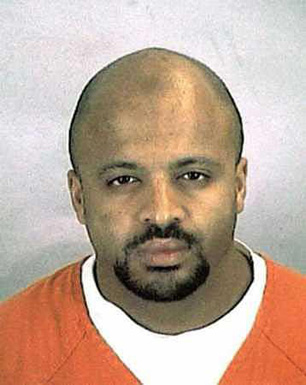Washington – A British court on Friday agreed to send five accused terrorists to the United States to stand trial for a wide range of alleged crimes, including the 1998 bombings of two American embassies in East Africa that killed more than 220 people.
The court’s decision cleared the way for what will be among the highest profile terrorism prosecutions in the United States in recent years.
Among the suspects was Abu Hamza al Masri, a one-eyed radical Islamist preacher who is accused of supporting al Qaida. The Egyptian-born Masri, a striking figure with a bushy beard and a hook in place of his missing right hand, could appear before an American judge within days on terror charges that are unusual because many of the alleged crimes predate the Sept. 11, 2001, attacks.
Masri, 54, is sought by U.S. prosecutors for his alleged involvement in a deadly kidnapping in Yemen and in plans for a militant training camp in Oregon. His tirades against the West, including voicing support for the Sept. 11 terrorist attacks, reportedly inspired several high-profile militants, such as the so-called “20th hijacker,” Zacarias Moussaoui.
On Friday, two United Kingdom High Court judges dismissed Masri’s request to delay proceedings in order for him to undergo a brain scan that his lawyers said would prove he was unfit for transfer, according to news reports. Masri didn’t attend the court session.
“The sooner he is put on trial, the better,” the British judges said in their decision, according to the BBC.
U.S. authorities are “extremely pleased” with the court’s decision, Justice Department spokesman Dean Boyd said in a statement. Boyd called the extraditions “a critical milestone in a multi-year effort by successive U.S. administrations to bring these terrorism suspects to justice.”
Masri had fought his extradition for eight years, with lawyers arguing that his transfer to the United States would be detrimental to ailments such as depression and sleep deprivation stemming from his long stint in prison.
The judges countered that U.S. prisoners have access to good medical care. The BBC reported that all five suspects already had left prison and would be en route soon to the United States via civilian planes belonging to the Justice Department. Boyd said the men would be held in federal detention facilities, but he declined to say where.
“We are confident that, like other terrorist defendants incarcerated in our federal prisons, these defendants can be housed securely with no danger to the public,” Boyd said.
Under no circumstances will the men be sent to the U.S. prison camp at Guantanamo, Cuba, for prosecution at the Pentagon’s war court, a Justice Department source told The Miami Herald on Friday, soon after extradition was approved.
“The United Kingdom has authorized their extradition to the United States only for prosecution on the charges pending against them in federal civilian courts, and, therefore, they may not be tried in military commissions,” said the official, who answered questions on condition he not be named.
Their federal indictments date back to the Clinton and Bush administrations, said the official, who noted that several co-defendants and associates of the men now facing extradition from Britain already have been prosecuted and sentenced in terror cases in federal courts in Manhattan and Connecticut.
To make sure they wouldn’t go to Guantanamo for prosecution, the British government specifically sought, and got, “binding commitments” between 2004 and 2008 regarding these five particular men, the official said. The negotiations, done as part of U.S.-U.K. treaty negotiations, made clear they “would only be tried in federal civilian court,” he added.
Abu Hamza al Masri is a nom de guerre. He was born Mustafa Kamel Mustafa, according to the Justice Department, and immigrated to the United Kingdom to study engineering in the 1970s. A former nightclub bouncer, Masri gained a following as the imam of the notorious Finsbury Park Mosque in north London before British authorities jailed him in 2006 for inciting murder and racial hatred based on fiery sermons he’d delivered years earlier.
The United States has sought to extradite him since 2004, when a federal grand jury in New York indicted him on 11 charges, including hostage-taking and conspiracy to take hostages. Sixteen tourists were held captive in the 1998 attack in Yemen. Four of them were killed.
Masri also was indicted for “providing material support” to terrorists for allegedly setting up an al Qaida training camp in Bly, Ore., from 1999 to 2000, and for supporting violent jihad in Afghanistan.
Adel Abdel Bary, a 52-year-old Egyptian citizen, and Khaled al-Fawwaz, a 50-year-old Saudi Arabian citizen, face murder and conspiracy charges in connection with the bombings of U.S. embassies in Tanzania and Kenya in August 1998. They were indicted by a federal grand jury in New York in 2000.
British citizens Babar Ahmad, 38, and Syed Talha Ahsan, 33, were indicted in Connecticut in 2004 and 2006 on charges of providing material support to terrorists and conspiracy to kill people overseas. Ahmad also is accused of money laundering.
Carol Rosenberg of The Miami Herald contributed.
Join us in defending the truth before it’s too late
The future of independent journalism is uncertain, and the consequences of losing it are too grave to ignore. To ensure Truthout remains safe, strong, and free, we need to raise $27,000 in the next 24 hours. Every dollar raised goes directly toward the costs of producing news you can trust.
Please give what you can — because by supporting us with a tax-deductible donation, you’re not just preserving a source of news, you’re helping to safeguard what’s left of our democracy.
